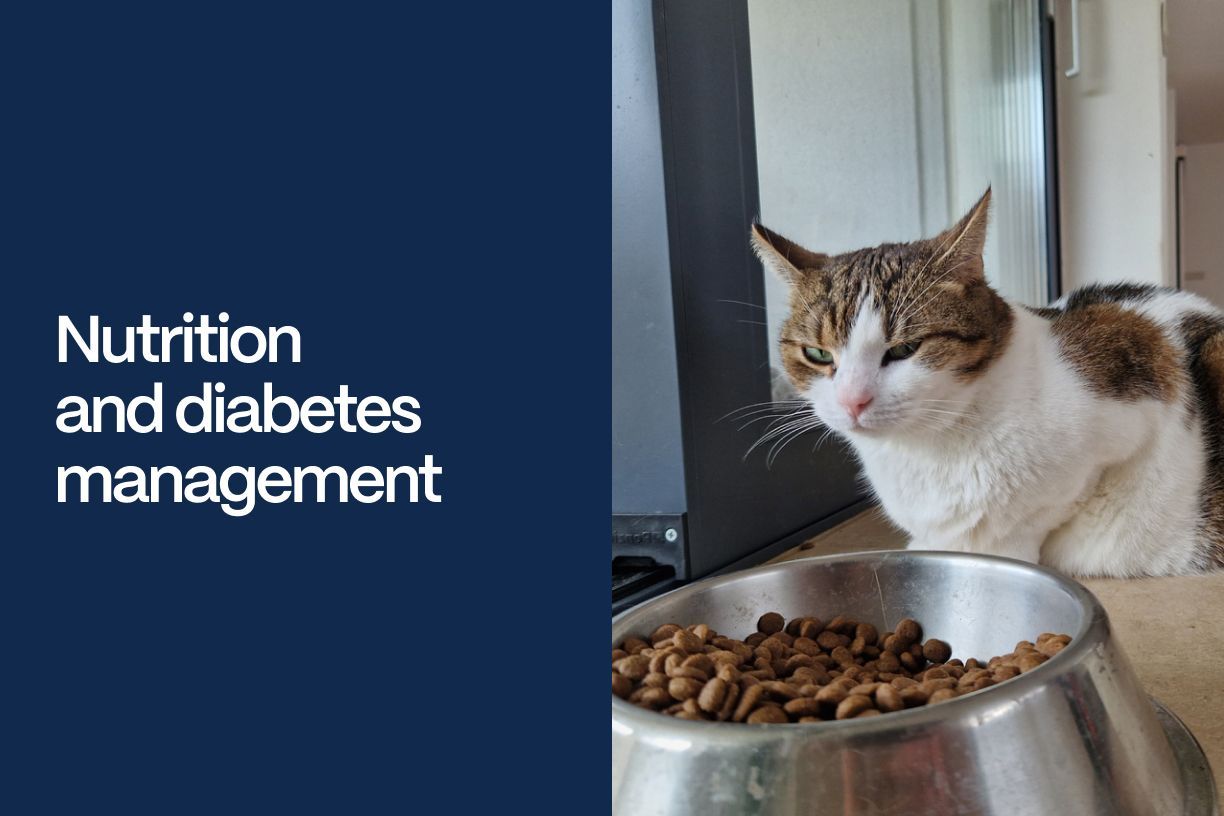Nutrition and diabetes management

Diabetes mellitus is unfortunately common in US pets, and nutrition plays an important role in managing the disease for the approximately 1% of pets who will experience it during their lifetimes. With Vetster, clients can get the ongoing support they need without leaving home. Virtual care is an excellent way to supplement in-person care for diabetic pets, and your nutrition recommendations can play a critical role in optimizing diabetes treatment.
Adapting to life with a diabetic pet is complicated and owners can be overwhelmed by everything they’re supposed to learn. Owners often have questions about the treatment plan and their pet’s status, so they need timely access to triage services and accurate information. This is even more important when their pet is newly diagnosed and everything is unfamiliar. You can be there to coach them on many aspects of dealing with diabetes, like how to give insulin, interpret blood glucose results, or feed their diabetic pets. With client demand for digital-first solutions growing, virtual care is also a great fit for long-term support for established diabetics.
Owners of diabetic pets usually have an abundance of questions, and it’s often difficult to find time to address them during a busy day in the clinic. You can position yourself for success on Vetster by being ready to answer questions like:
- What diet is best for my diabetic cat?
- How many times a day should I feed my diabetic pet?
- I’m supposed to switch my newly diagnosed diabetic cat to special food, but I have two other cats and they all eat from the same bowl. How do I handle this?
- How much weight does my cat need to lose?
- We accidentally gave two doses of insulin tonight. What should we do?
- My diabetic pet isn’t eating tonight. What should I do?
- I’m new at this and can’t remember what my vet said about how to mix, measure, and administer insulin. Can you help?
- I forgot to put the insulin back in the fridge and it was out all day. Is this a problem?
- I’m going away for the weekend and can’t find anyone to give my cat his insulin. What could happen if he goes without?
- I’ve already got one diabetic cat and my other cat is overweight. How do I get him to lose weight?
- Is my dog more likely to get diabetes if I feed him from the table?
With Vetster’s in-app messaging tools, sharing client education resources is quick and easy. You can paste links into your medical records or include them in a direct message to the client. Vetster’s video appointment platform is great for synchronous care, but clients appreciate having information in writing so they can review and digest it at their own pace after the appointment.
To provide top-tier virtual care, keep your favorite resources close at hand and share them generously with your clients. Here are some examples:
- Vetster’s Pet Connection blog on “Diabetes in Pets”
- Vetster’s diabetes mellitus in dogs and cats articles
- Cornell’s “Managing Canine Diabetes” client handout
- Client handout on diabetes treatment in cats from Tufts
- Home monitoring of blood glucose
- “Caring for Your Diabetic Cat” video
VetsterRx makes it easy to connect clients to the therapeutic diets, OTC items, and prescription medications they need to keep their diabetic pets healthy. In addition, it’s simple and fast to request follow-up appointments so you can provide the personal support that today’s pet owners are looking for. Similarly, our records-sharing feature makes it easy to keep the client’s brick-and-mortar clinic in the loop for optimal continuity of care.
By working as a team, owners and veterinarians can be a part of enhancing the quality of life for dogs and cats living with diabetes mellitus. Vetster is here to make sure you have easy access to the tools you need to make a profound impact on the well-being of our furry companions everywhere.
Additional Stats and Sources
Still hungry for more information on nutrition and diabetes mellitus? Check out these great resources curated by our medical advisor, Dr. Jo Myers
- The prevalence of diabetes mellitus in dogs showed a nearly 80% increase over a ten-year study period.
- Glycemic control and quality of life in diabetic dogs can be significantly improved with a high-fiber diet.
- A consistent dietary regime of multiple small meals fed throughout the day and evening may lead to a decreased exogenous insulin requirement in dogs and cats.
- Diabetes resources from Tufts Clinical Nutrition Services.
- Cornell Feline Health Center’s client information page.
Looking to join Vetster?
You may create an account as a veterinary professional, or learn more here.









